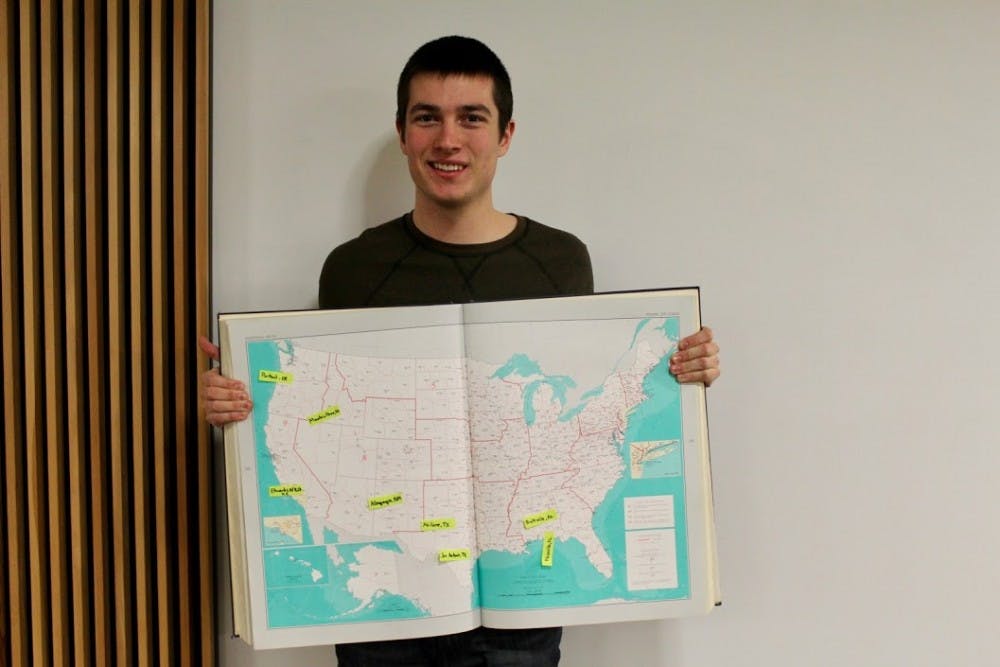As the kid of a parent in the Air Force, I’ve had the pleasure of moving around quite a bit. I’ve also faced the challenges of a parent gone on deployment and know firsthand the stressors families in the military face. I have a deep gratitude for those who have served, but also an understanding of the unique challenges “military brats,” as military children are colloquially referred to, have faced.
That’s why when I met a blonde-haired, lanky freshman named Sam Abell last fall in the basement of Christie Hall baking a pan of lasagna in the community oven and asked him where he was from, I thought I knew what he meant when he responded, “Where should I start?” My suspicions were unofficially confirmed when I looked down and saw his thick black watch set to military time; perhaps he was brat, too.
“I like to cook,” Abell says. He pays for the communal meals himself, which explains why this is a vegetarian lasagna. “Meat is expensive,” he notes; as a college student, every penny counts.
He’s frugal, too — another tell-tale trait I’ve gathered from the many military families I’ve met around the country.
The lasagna turns out lovingly sloppy — crispy on the top, runny in the middle. Surely, the dirty, old communal oven is at fault.
Born in New Jersey, Abell has moved eight times because of his father’s role flying C-5 cargo jets in the Air Force. Picking up and leaving every three months to three years, he has moved to California, Alabama, Montana, Virginia, Guam, Colorado, and finally to Portland for college. His four years at UP will be the longest he’s been in one place.
As a young boy, it was initially hard making friends and leaving them soon after, but Abell became familiar with it. To his friends, it made little sense.
“They didn’t understand what was going on,” Abell says.

Transitioning from duty to duty requires service members and their families to move much more frequently than civilians. According to the Department of Defense Education Activity (DODEC), school-aged military children move an average of six to nine times during their school career. That is, on average, three times more frequently than non-military families, the DODEC says.
The U.S. Department of Defense estimates that 15 million Americans are former or current children of service members, and a number of them now call UP home.
When it happened to Quentin Ward for the first time, he was confused – he was told to get in the car, but he didn’t want to. He didn’t understand why his parents had packed the car to the brim with their belongings. He was young, just three years old, but was cognizant of the fact that getting in the car meant leaving his home.
“I don’t remember them telling me we were leaving,” Ward recalls. “I was just confused; I didn’t want to leave and I didn’t understand why we were leaving. At that age you don’t really know why, and so they said, ‘Oh we’re going to a new home,’ and I was like, ‘But this is home.’”
Ward is now a senior electrical engineering major at the University of Portland whose father spent close to 25 years in the Air Force. Like Abell, Ward moved around frequently during his childhood.
But both Ward and Abell say they think the exposure to different cultures and experiences due to the many moves made them more educated and well-rounded in the long run.
“When you just stay in one place you fear change,” says Ward. “So if you’re able to get out there more and move around the country, you realize it’s not that bad. It’s actually kind of fun because you meet new people and you see new things.”
For Ward, switching schools came with challenges. In second grade he attended a school in Pratville, Alabama where the education level was so far behind where he came from in California that he got bored in class and began reading books from the library to entertain himself. But when the teachers saw he wasn’t paying attention in classes, the library instituted a six book per-day check-out limit.
Eight months later, after his father was transferred to a base in San Antonio, Texas, Ward would rack up over a thousand points for the accelerated reading program at the school he attended for fourth and fifth grade, where he says the school fostered his love for reading.

“The level of education is just so different everywhere,” Ward said.
But frequent moves are perhaps the lesser of the stressors military children face. I think military children would agree that coping with a family member’s deployment and the possibility of them not returning home has a greater impact on their emotional response than leaving friends behind for a new town.
Often separated from their families for weeks or even months on end for foreign missions, families must learn to cope with the experience of saying goodbye and knowing that it could be the for the last time. Oftentimes, deployment involves overseas duty in active war zones.
“When my dad would be going on a trip, he’d say he’d be back on Sunday, and we’d ask him, ‘Of which week?’” Abell says with a chuckle.
Dominic Lazzaro, a fifth-year political science major who plans to enlist in the Army as a combat medic after he graduates in May, did not grow up in a household with military parents; however, with a sister, uncles and a grandparent who served in the military, Lazzaro is no stranger to the lifestyle.
Lazzaro’s older sister enlisted in the Army as a paralegal 11 years ago. During her year-long deployment to Kandahar, Afghanistan, Lazzaro said she had experiences of friends going out on patrol and not coming back.
“There was a time when I got to see my parents really concerned,” Lazzaro recalled.
A soldier was killed, and all communication shutdown from the base in Afghanistan for days while relatives of the deceased were notified. Lazzaro’s family prayed while they waited to hear from her.
“We knew the likelihood of it being her was pretty small, because she’s not out fighting, but at the same time we knew she was there,” Lazzaro recalled. “I got to see what kind of role that played on my parent’s psyche.”
Although research suggests that most military children are healthy and resilient, studies show that children of active duty service people can develop mental health issues and experience feelings of isolation and invisibility due to the stressors of deployment.
According to a study published in the Journal of Adolescent Health in 2014, about 30 percent of kids from military families reported, “feeling sad almost every day for two weeks during the past 12 months,” while nearly one-in-four reported having considered suicide. This is compared with 20 percent of similarly-aged non-military youth who have a mental illness, according to the National Alliance on Mental Illness. Anxiety and depression in military kids is especially exacerbated during times of their parent’s deployment.
Military children can also experience what doctors refer to as secondary PTSD – it can occur simply by living with a traumatized military service member. Author and psychotherapist Stephanie Donaldson Pressman defines trauma as “anything that happens to you over which you have no control.” Pressman separates traumas military children experience into two camps: “Little Traumas” and “Big Traumas”.
Examples of Big Traumas include exposure to war and violence during overseas assignments, a parent’s death, exposure to weapons, and witnessing the effect of the violence of war on parents, including anger, tension, depression, domestic violence and alcohol or drug abuse.

While I personally have not been diagnosed with a mental illness, nor experienced “Big Traumas,” my father’s service definitely played a role in my childhood anxieties. After 9/11, I slept in my father’s spot in the bed whenever he was gone – I’d say I was “keeping it warm” for him when he got home, but really I couldn’t shake the nightmares that came from imagining what could happen to him in the Middle East. I was just 6 years old, but I understood enough to know what war was and that life was delicate.
Most military children, including Abell and Ward, have dealt with the Little Traumas, which can include multiple moves and parental absence. But despite these experiences, children whose immediate family members are veterans are twice as likely to join the military than those who are not, according to the PEW Research Center.
For Abell, Ward and Lazzaro, joining the military has always been at the forefront of their minds, but never something they felt pressured into.
Abell was recently accepted to the Air Force ROTC program at UP, and Ward considered joining ROTC, but ultimately decided he could serve his country in other ways.
Lazzaro knew he wanted to join the military since he was a five-year-old playing with little green toy soldiers. In kindergarten, when told to draw what he wanted to be when he grew up, Lazzaro scribbled a mess of green crayon and the teacher wrote next to it, “I want to be an Army Man.”
Lazzaro and Abell look forward to the duty that lies ahead of them, knowing full well the challenges their potential families and children may face.
“When you know from such a young age that this is what you want to do, then your whole life wraps around that,” Lazzaro said.








